北师大版(2019) 选择性必修第一册 Unit 3 Conservation The Road to Destruction reading and thinking课件(15张)
文档属性
| 名称 | 北师大版(2019) 选择性必修第一册 Unit 3 Conservation The Road to Destruction reading and thinking课件(15张) | 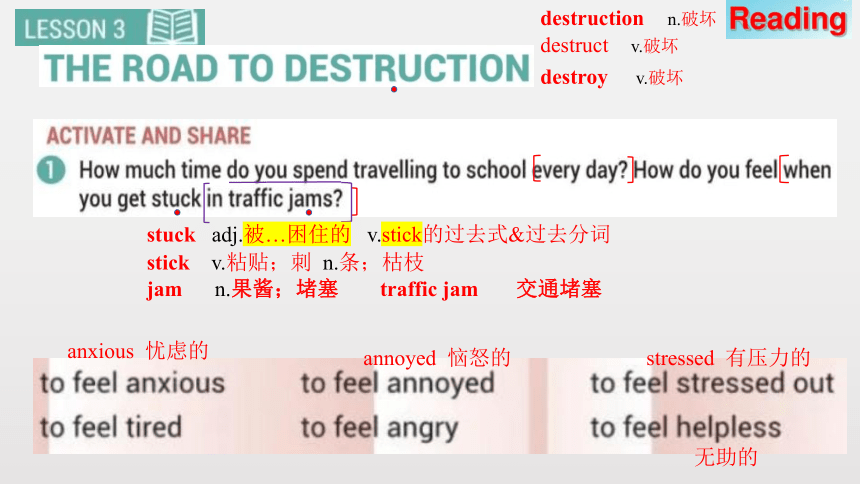 | |
| 格式 | pptx | ||
| 文件大小 | 1.1MB | ||
| 资源类型 | 教案 | ||
| 版本资源 | 北师大版(2019) | ||
| 科目 | 英语 | ||
| 更新时间 | 2022-05-23 10:48:00 | ||
图片预览

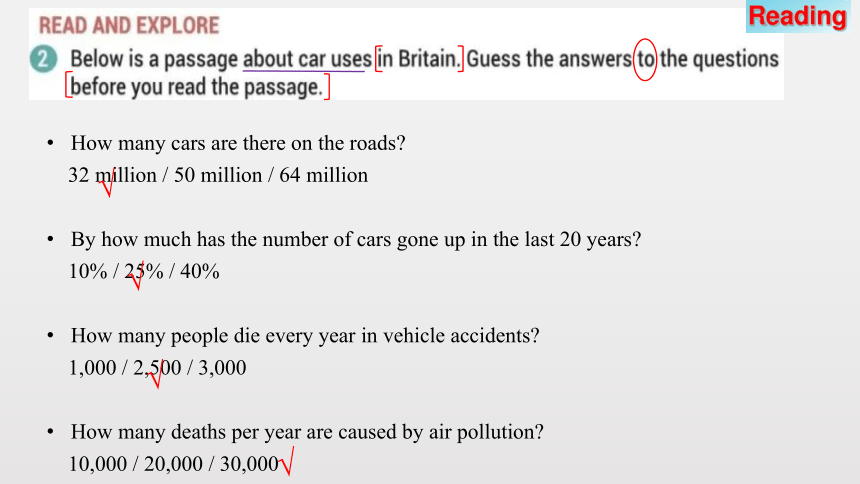
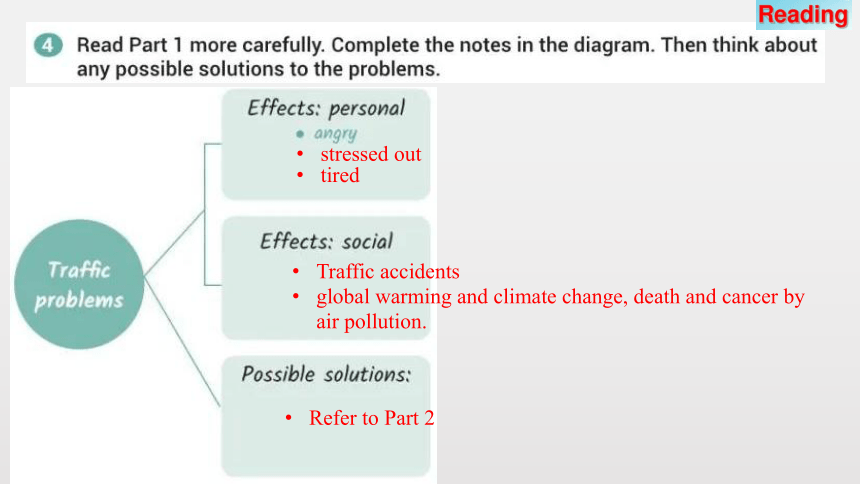
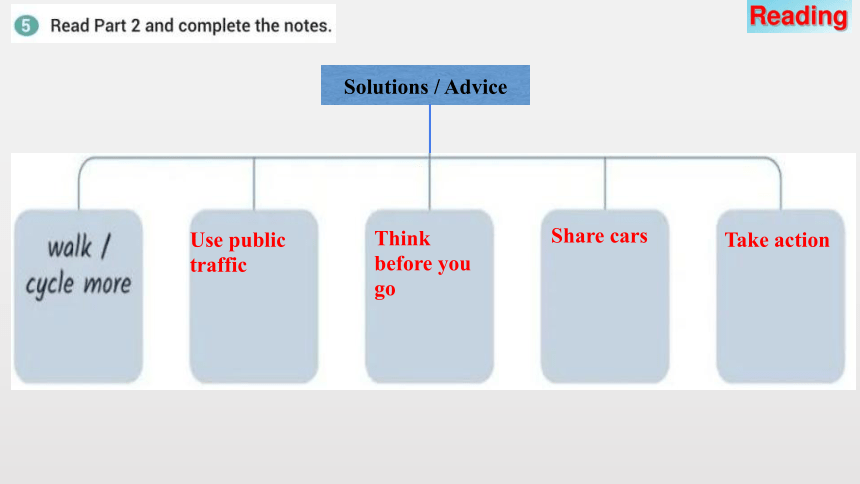
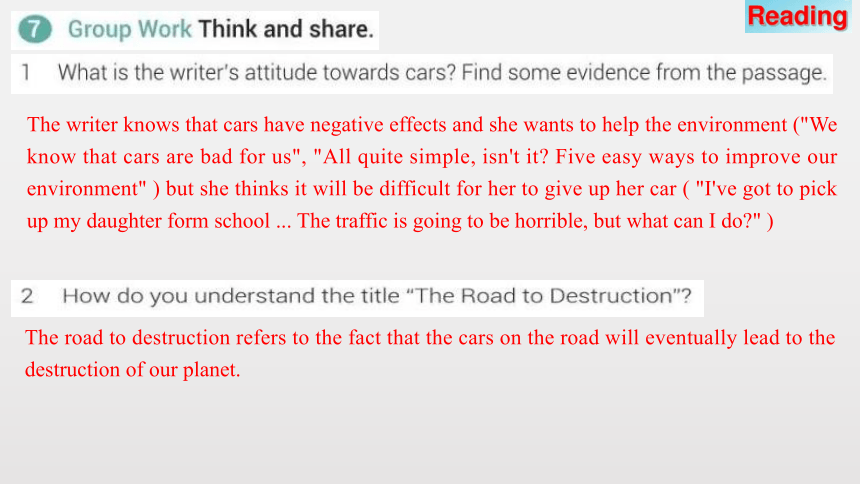
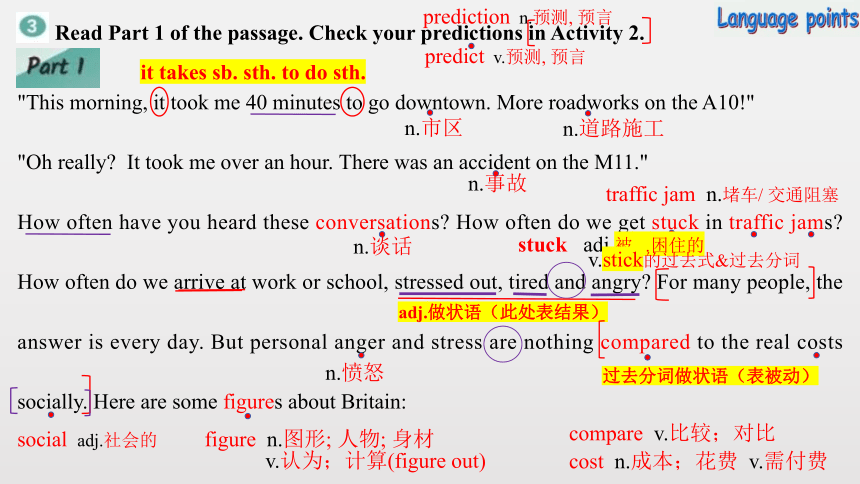
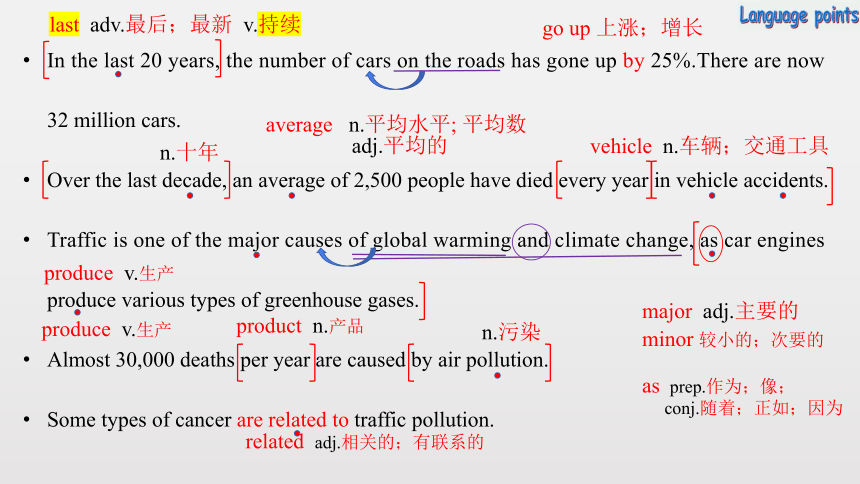
文档简介
(共15张PPT)
destruction n.破坏
destruct v.破坏
destroy v.破坏
stuck adj.被…困住的 v.stick的过去式&过去分词
stick v.粘贴;刺 n.条;枯枝
jam n.果酱;堵塞
traffic jam 交通堵塞
anxious 忧虑的
annoyed 恼怒的
stressed 有压力的
无助的
How many cars are there on the roads
32 million / 50 million / 64 million
By how much has the number of cars gone up in the last 20 years
10% / 25% / 40%
How many people die every year in vehicle accidents
1,000 / 2,500 / 3,000
How many deaths per year are caused by air pollution
10,000 / 20,000 / 30,000
√
√
√
√
stressed out
tired
Traffic accidents
global warming and climate change, death and cancer by air pollution.
Refer to Part 2
Solutions / Advice
Use public traffic
Think before you go
Share cars
Take action
The writer knows that cars have negative effects and she wants to help the environment ("We know that cars are bad for us", "All quite simple, isn't it Five easy ways to improve our environment" ) but she thinks it will be difficult for her to give up her car ( "I've got to pick up my daughter form school ... The traffic is going to be horrible, but what can I do " )
The road to destruction refers to the fact that the cars on the road will eventually lead to the destruction of our planet.
Read Part 1 of the passage. Check your predictions in Activity 2.
"This morning, it took me 40 minutes to go downtown. More roadworks on the A10!"
"Oh really It took me over an hour. There was an accident on the M11."
How often have you heard these conversations How often do we get stuck in traffic jams How often do we arrive at work or school, stressed out, tired and angry For many people, the answer is every day. But personal anger and stress are nothing compared to the real costs socially. Here are some figures about Britain:
prediction n.预测, 预言
predict v.预测, 预言
n.市区
it takes sb. sth. to do sth.
n.道路施工
n.事故
n.谈话
stuck adj.被…困住的
v.stick的过去式&过去分词
traffic jam n.堵车/ 交通阻塞
adj.做状语(此处表结果)
n.愤怒
compare v.比较;对比
cost n.成本;花费 v.需付费
过去分词做状语(表被动)
social adj.社会的
figure n.图形; 人物; 身材
v.认为;计算(figure out)
In the last 20 years, the number of cars on the roads has gone up by 25%.There are now 32 million cars.
Over the last decade, an average of 2,500 people have died every year in vehicle accidents.
Traffic is one of the major causes of global warming and climate change, as car engines produce various types of greenhouse gases.
Almost 30,000 deaths per year are caused by air pollution.
Some types of cancer are related to traffic pollution.
go up 上涨;增长
last adv.最后;最新 v.持续
n.十年
average n.平均水平; 平均数
adj.平均的
vehicle n.车辆;交通工具
major adj.主要的
minor 较小的;次要的
as prep.作为;像;
conj.随着;正如;因为
produce v.生产
produce v.生产
product n.产品
n.污染
related adj.相关的;有联系的
be related to 与…有关
related adj.相关的;有联系的
relate v. 联系
relation n.关联;联系
relative n.亲戚 adj. 相对的;相关联的
We know that cars are bad for us. But we all make excuses: "The buses are terrible"; "The trains are always late"; "I haven't got time to walk". I'm talking about myself, too. To be frank, I'm addicted to my car. When I asked Jenny Trowe of Greenpeace for advice about how to give up, she told me five things:
excuse n.借口;理由 v.原谅;宽恕
be addicted to... 沉迷于...
Use your legs. In 2014, over 55% of car journeys were under eight kilometres. Instead of taking short car journeys, we could easily walk or cycle. Leg power can save your money, keep you fit and help you live longer. Regular exercise also cuts the risk of heart disease by 50%!
journey n.旅行
trip n.旅游;绊倒 v.将…绊倒
travel n./v.旅行
regular adj.规则的;定期的
Use public transport. Up to 90 people can travel in one bus, while the same number will need at least 18 cars. Sometimes it can take a little bit longer, but so what You can relax, read a book, talk to someone - who knows
Think before you go. Do you really have to go to that shopping centre on the other side of town What about the shops around the corner Before you get into your car, think about whether you really need to make that journey.
up to 多达
而;当...
at least 至少
so what 那又怎样
side n.边
around the corner 在拐角处;即将来临
whether 是否
whether 引导的宾语从句
Share cars. If you really have to use a car, share journeys with someone else. It is much cheaper and kinder to the environment.
Take action! We often think there is nothing we can do about the noise, pollution and danger of traffic. There is. If your street is full of heavy traffic, talk to your neighbours about it. Write to the papers. Go to the city government. Ask for a speed limit. Do whichever of these things that suit you. Don't just sit around and complain!
that
噪音
污染
交通拥挤
paper n.论文;报纸;纸
ask for 请求;要求
suit v.适合 n.诉讼;套装
whichever 无论哪一个
wherever 无论哪里
whoever 无论谁
whenever 无论何时
v.抱怨
All quite simple, isn't it Five easy ways to improve our environment. Well, I'm sorry I have to finish this article, but l've got to pick up my daughter from school at 4 pm. Then l've got to drive to the supermarket to do the shopping. After that, I have to take my son to a party. The traffic is going to be horrible, but what can I do
quite adv.十分
quiet adj.安静的
simple adj.简单的
simply adv.简单地; 仅仅
n.文章
pick up 捡起; 接
have got to 不得不;必须
horrible adj. 极坏的;可怕的;恐怖的
terrible adj. 令人极不快的;可怕的
make excuses 找借口
碰上交通堵塞
be addicted to 沉迷于...
保护环境
pick up sb. 接某人
Many people often 1 when they go towork. How annoyed and stressful they often feel! But the problem is that the number of cars is still going up.Traffic pollution has been found to 2 and climate change to a large degree.
Too many cars 3 to the environment and our health. Some advice has been given for people to help 4 for example, using public transport or 5 , doing your shopping in the shop just around the corner instead of driving to the other side of town. However, people 6 using cars.They 7 for using their cars, "I need to 8 my daughter. What can I do "
get stuck in a traffic jam
cause global warming
do a lot of harm
protect the environment
sharing cars
are addicted to
make excuses
pick up
destruction n.破坏
destruct v.破坏
destroy v.破坏
stuck adj.被…困住的 v.stick的过去式&过去分词
stick v.粘贴;刺 n.条;枯枝
jam n.果酱;堵塞
traffic jam 交通堵塞
anxious 忧虑的
annoyed 恼怒的
stressed 有压力的
无助的
How many cars are there on the roads
32 million / 50 million / 64 million
By how much has the number of cars gone up in the last 20 years
10% / 25% / 40%
How many people die every year in vehicle accidents
1,000 / 2,500 / 3,000
How many deaths per year are caused by air pollution
10,000 / 20,000 / 30,000
√
√
√
√
stressed out
tired
Traffic accidents
global warming and climate change, death and cancer by air pollution.
Refer to Part 2
Solutions / Advice
Use public traffic
Think before you go
Share cars
Take action
The writer knows that cars have negative effects and she wants to help the environment ("We know that cars are bad for us", "All quite simple, isn't it Five easy ways to improve our environment" ) but she thinks it will be difficult for her to give up her car ( "I've got to pick up my daughter form school ... The traffic is going to be horrible, but what can I do " )
The road to destruction refers to the fact that the cars on the road will eventually lead to the destruction of our planet.
Read Part 1 of the passage. Check your predictions in Activity 2.
"This morning, it took me 40 minutes to go downtown. More roadworks on the A10!"
"Oh really It took me over an hour. There was an accident on the M11."
How often have you heard these conversations How often do we get stuck in traffic jams How often do we arrive at work or school, stressed out, tired and angry For many people, the answer is every day. But personal anger and stress are nothing compared to the real costs socially. Here are some figures about Britain:
prediction n.预测, 预言
predict v.预测, 预言
n.市区
it takes sb. sth. to do sth.
n.道路施工
n.事故
n.谈话
stuck adj.被…困住的
v.stick的过去式&过去分词
traffic jam n.堵车/ 交通阻塞
adj.做状语(此处表结果)
n.愤怒
compare v.比较;对比
cost n.成本;花费 v.需付费
过去分词做状语(表被动)
social adj.社会的
figure n.图形; 人物; 身材
v.认为;计算(figure out)
In the last 20 years, the number of cars on the roads has gone up by 25%.There are now 32 million cars.
Over the last decade, an average of 2,500 people have died every year in vehicle accidents.
Traffic is one of the major causes of global warming and climate change, as car engines produce various types of greenhouse gases.
Almost 30,000 deaths per year are caused by air pollution.
Some types of cancer are related to traffic pollution.
go up 上涨;增长
last adv.最后;最新 v.持续
n.十年
average n.平均水平; 平均数
adj.平均的
vehicle n.车辆;交通工具
major adj.主要的
minor 较小的;次要的
as prep.作为;像;
conj.随着;正如;因为
produce v.生产
produce v.生产
product n.产品
n.污染
related adj.相关的;有联系的
be related to 与…有关
related adj.相关的;有联系的
relate v. 联系
relation n.关联;联系
relative n.亲戚 adj. 相对的;相关联的
We know that cars are bad for us. But we all make excuses: "The buses are terrible"; "The trains are always late"; "I haven't got time to walk". I'm talking about myself, too. To be frank, I'm addicted to my car. When I asked Jenny Trowe of Greenpeace for advice about how to give up, she told me five things:
excuse n.借口;理由 v.原谅;宽恕
be addicted to... 沉迷于...
Use your legs. In 2014, over 55% of car journeys were under eight kilometres. Instead of taking short car journeys, we could easily walk or cycle. Leg power can save your money, keep you fit and help you live longer. Regular exercise also cuts the risk of heart disease by 50%!
journey n.旅行
trip n.旅游;绊倒 v.将…绊倒
travel n./v.旅行
regular adj.规则的;定期的
Use public transport. Up to 90 people can travel in one bus, while the same number will need at least 18 cars. Sometimes it can take a little bit longer, but so what You can relax, read a book, talk to someone - who knows
Think before you go. Do you really have to go to that shopping centre on the other side of town What about the shops around the corner Before you get into your car, think about whether you really need to make that journey.
up to 多达
而;当...
at least 至少
so what 那又怎样
side n.边
around the corner 在拐角处;即将来临
whether 是否
whether 引导的宾语从句
Share cars. If you really have to use a car, share journeys with someone else. It is much cheaper and kinder to the environment.
Take action! We often think there is nothing we can do about the noise, pollution and danger of traffic. There is. If your street is full of heavy traffic, talk to your neighbours about it. Write to the papers. Go to the city government. Ask for a speed limit. Do whichever of these things that suit you. Don't just sit around and complain!
that
噪音
污染
交通拥挤
paper n.论文;报纸;纸
ask for 请求;要求
suit v.适合 n.诉讼;套装
whichever 无论哪一个
wherever 无论哪里
whoever 无论谁
whenever 无论何时
v.抱怨
All quite simple, isn't it Five easy ways to improve our environment. Well, I'm sorry I have to finish this article, but l've got to pick up my daughter from school at 4 pm. Then l've got to drive to the supermarket to do the shopping. After that, I have to take my son to a party. The traffic is going to be horrible, but what can I do
quite adv.十分
quiet adj.安静的
simple adj.简单的
simply adv.简单地; 仅仅
n.文章
pick up 捡起; 接
have got to 不得不;必须
horrible adj. 极坏的;可怕的;恐怖的
terrible adj. 令人极不快的;可怕的
make excuses 找借口
碰上交通堵塞
be addicted to 沉迷于...
保护环境
pick up sb. 接某人
Many people often 1 when they go towork. How annoyed and stressful they often feel! But the problem is that the number of cars is still going up.Traffic pollution has been found to 2 and climate change to a large degree.
Too many cars 3 to the environment and our health. Some advice has been given for people to help 4 for example, using public transport or 5 , doing your shopping in the shop just around the corner instead of driving to the other side of town. However, people 6 using cars.They 7 for using their cars, "I need to 8 my daughter. What can I do "
get stuck in a traffic jam
cause global warming
do a lot of harm
protect the environment
sharing cars
are addicted to
make excuses
pick up
同课章节目录
- Unit 1 Relationshis
- Lesson 1 Teachers
- Lesson 2 How Do We Like Teachers’ Feedback?
- Lesson 3 So Close,Yet So Fa
- Unit 2 Success
- Lesson 1 Money vs Success
- Lesson 2 Top Five Secrets of Success
- Lesson 3 Getting to the Top
- Unit 3 Conservation
- Lesson 1 The Sixth Extinction
- Lesson 2 War on Plastic Packets
- Lesson 3 The Road to Destruction
